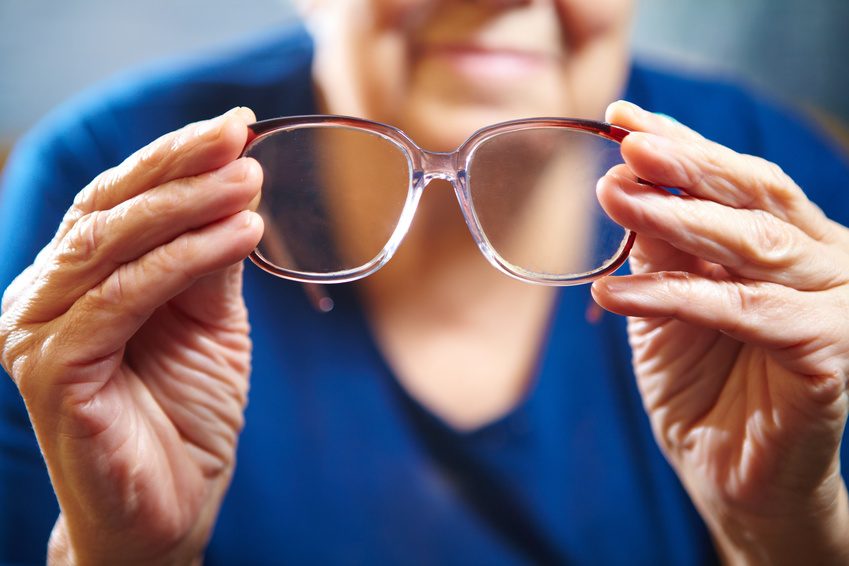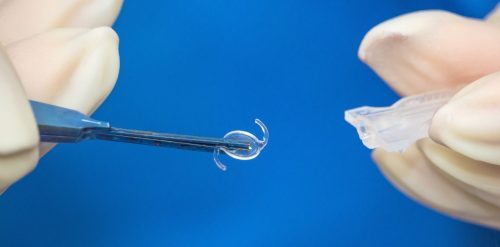Patients who need cataract surgery can choose from several types of intraocular lenses. Focus asked Nandini Venkateswaran, MD, a member of the Cornea and Refractive Surgery Service at Mass Eye and Ear, to help break down the options.
Cataracts are a leading cause of blindness. Once a person experiences significant symptoms, it might be time to get surgery, which involves removing a transparent piece of tissue in the eye called the lens because it has become cloudy. The lens is then replaced with an artificial lens, or intraocular lens. Prior to surgery, a patient can choose from several types of intraocular lenses that vary in costs and focusing powers.
These lenses can remain in patients’ eyes for the rest of their lives, so how do people make this difficult choice?
Dr. Venkateswaran, an ophthalmologist who sees patients at the Mass Eye and Ear, Waltham location, said this conversation typically starts during a surgical consultation. There, she will learn about the patient’s treatment goals. Some might be on a computer screen all day for work and want to see it better; others may be avid runners or golfers and require a lens that can fit their active outdoor lifestyles. A patient’s anatomy or existence of other eye conditions can also play a major role in determining the best selection.
“In the past decade, we’ve seen an explosion in the number of lens options available to patients,” Dr. Venkateswaran told Focus. “We help patients come to a choice by learning what their day-to-day life is like and what they want to get out of their vision after cataract surgery.”
At the time of cataract surgery, patients have a one-time opportunity to select lens that will give them the best vision and this can be a challenging choice. Dr. Venkateswaran explained the lenses a patient can choose from, and who might benefit most from each type.
Monofocal lenses
 The most common type of intraocular lens is a monofocal lens. Typically covered by insurance, the lens offers one focusing distance, meaning it can either best focus at distance, intermediate or close up. Therefore, a patient who chooses a long distance focus will need to wear reading glasses for all up-close tasks.
The most common type of intraocular lens is a monofocal lens. Typically covered by insurance, the lens offers one focusing distance, meaning it can either best focus at distance, intermediate or close up. Therefore, a patient who chooses a long distance focus will need to wear reading glasses for all up-close tasks.
“Some patients don’t mind the dependence on glasses; they’ve worn glasses their whole lives so their lifestyle would not change,” said Dr. Venkateswaran. “Others may want to use cataract surgery as the time to reduce their reliance on glasses.”
If a patient had previously gotten cataract surgery on one eye and received a monofocal lens and now needs cataract surgery on the other eye, a second monofocal lens is often recommended to ensure consistency in vision, either focused at a distance or with a blended intermediate/close-up target.
For people with lifestyles where only one focus distance may be less than ideal, they can choose from several types of premium lenses.
Multifocal, trifocal or presbyopia (farsightedness)-correcting lenses
Multifocal lenses or the newest available trifocal lenses, are good options for people with overall healthy eyes without other diseases. The trifocal lens splits light in a way to give a person a larger range of focus for multiple distances: far, intermediate and near. This can dramatically reduce a person’s need for glasses on a daily basis.
Many patients prefer these lenses due to their overall vision improvement and ability to be glasses-independent according to Dr. Venkateswaran. But, she cautioned one factor that concerns some is the appearance of glare or halos at night, such as when viewing a bright headlight or street light when driving. Glare and halos can fade with time as patients “neuroadapt,” meaning their brain adapts to this phenomena (like they might get used to a floater), often over six months.
“Some patients might say, ‘If I can get both distance and reading with a trifocal lens, that’s the lens I want,” said Dr. Venkateswaran. “Others might drive a lot at night and not want any glare or haloes whatsoever, and therefore opt for a monofocal lens.”
Extended depth of focus lenses
Extended depth of focus lenses, unlike monofocal lenses, stretch and shift light in a way to provide patients with a larger range of vision. With these lenses, patients receive excellent distant and intermediate vision, and functional near vision. They might, however, not be completely independent of glasses, such as when reading small print or in dim light.
This lens differs from the trifocal because of the way it manipulates light rays, and with certain lens platforms, there’s less risk of glare and halos.
“This is a lens that can benefit a lot of people: patients who really want to lead an active lifestyle and spend a lot of time on the computer, who might not mind throwing on a pair of reading glasses in some settings,” said Dr. Venkateswaran.
Unlike trifocal lenses that require pristine eye health, patients who have other eye conditions, such as mild glaucoma or epiretinal membranes, can be candidates for extended depth of focus lenses.
Astigmatism-correcting lenses, or toric lenses
Patients who need cataract surgery and have astigmatism may benefit most from a premium lens called a toric lens. Astigmatism causes a change in the physical structure of the cornea, causing it to be a figure-eight or football shape. That means a traditional lens implant will not address all of the patient’s astigmatism. A toric lens is implanted into the eye after cataract surgery and is oriented to the axis needed to correct the astigmatism. Toric lenses are available not only as a monofocal platform but also in trifocal and extended depth of vision platforms, providing patients who have astigmastism with several options.
How to choose?
 It’s important to first keep in mind that no lens is perfect, and some patients might require reading glasses for tiny print even if opting for a newer technology. Next, patients should do their homework, and visit resources like the American Academy of Ophthalmology for more information.
It’s important to first keep in mind that no lens is perfect, and some patients might require reading glasses for tiny print even if opting for a newer technology. Next, patients should do their homework, and visit resources like the American Academy of Ophthalmology for more information.
“No lens is as perfect as the one you’re born with,” said Dr. Venkateswaran. “But we as surgeons have a toolbox of lenses available that we can match to your visual need and desires as well as lifestyle.”
For some patients, cost is a big factor. Premium lenses are not covered by commercial insurances or insurances like Medicare and require out-of-pocket payments, as they are all considered elective options. The out-of-pocket costs can also include surgery performed with femtosecond lasers, a technology which helps standardize some of the steps involved in cataract surgery and intraocular lens placement as well as correct lower degrees of astigmatism that are harder to correct with manual surgery. Out-of-pocket costs can also include the use of intra-operative aberrometry, which provides real-time measurements of the eye once the cataract is removed where a surgeon can confirm the patient’s lens choice to ensure the desired vision outcome.
Some patients may choose to get a premium lens and realize it does not fit their lifestyle as they hoped and want to go back to their glasses. “With any of these premium lens technologies, as surgeons we want patients to be happy first and foremost. We can always take out the premium lens and implant a monofocal lens if needed,” said Dr. Venkateswaran.
The doctor will speak with the patient and go over the pros and cons of each option, and will make a recommendation. At the end of the day, the decision is up to the patient, who is encouraged to also do their own research.
“After the consultation, it’s important for patients to do their research and be aware of any potential downsides. Spend one-on-one time with your surgeon discussing the surgical procedure and all lens options.” she said. “Thankfully, research shows that most people are happy and would get these surgeries done again.”
About the Expert:
 Nandini Venkateswaran, MD, is a member of the Cornea and Refractive Surgery Service at Mass Eye and Ear. She specializes in complex cataract surgery, corneal transplantation, laser refractive surgery, corneal cross-linking, anterior segment reconstruction and diagnosing and treating conditions of the eye’s surface. She sees patients at our Waltham location and Main Campus in Boston.
Nandini Venkateswaran, MD, is a member of the Cornea and Refractive Surgery Service at Mass Eye and Ear. She specializes in complex cataract surgery, corneal transplantation, laser refractive surgery, corneal cross-linking, anterior segment reconstruction and diagnosing and treating conditions of the eye’s surface. She sees patients at our Waltham location and Main Campus in Boston.


My partner tried multi-focal lenses and had a very bad experience with halos, glare, and neuro adjustment. She has tried to adjust over a period of almost five months, but with little success. She needs to exchange the lenses, but is very concerned about the safety of the procedure and is trying to locate a doctor with extensive experience doing intraocular lens exchange. We live in Portland, ME, but are willing to consider options near and far. Does anyone have suggestions about how to locate doctors that are especially experienced with this procedure?
Hi Michael, thanks for reading and your comment, and sorry to hear about your partner’s experience. Dr. Venkateswaran and numerous cataract surgeons at Mass Eye and Ear have experience in intraocular lens exchange. To make an appointment, you can call 781-890-1023.
Excellent Information!! I already have one of the premium lens in both eyes and have had laser surgery.
Thanks Carol, appreciate you reading and your comment!
I wish my surgeon had just taken a few minutes to discuss the cataract operation with me. I think my outcome would have been far different.
Hi Denise, thanks for your comment. We are sorry you did not have a good experience. Our doctors feel it is important to have a conversation with patients about the benefits and risks of all lens options prior to surgery.
Does cataract surgery cause dry eye?
Hi Sally, I checked in with Dr. Venkateswaran, and she said, “Cataract surgery itself doesn’t directly cause dry eye. If patients have dry eyes before surgery, it is common to have dry eyes after surgery. Everyone has some dryness and irritation for a few days/weeks after any surgery but this improves with eye drops and time.”
I was wondering; I lost my left eye from a bacterial infection and only have vision in my right eye but that eye soon needs to have an op for cataracts. What do u suggest to be the best path to take. I need reading glasses now but can see pretty well at distances. I do wear what I call, shopping glasses when I look at things and prices at the stores.
Hi William, thanks for reading and sharing your comment. We can’t provide specific medical advice for your situation in the blog, and encourage you to ask your eye doctor during your consultation.
I have dry eyes and my sight changes sometimes daily, my eye doctor said it is hard to get a good prescription for lens when you have cataracts and is there a cur for dry eyes?
To MICHAEL CURTIN: I’m from Portland also and MASS EYE & EAR is the best and well worth the trip. We’ve found the MDs there to be outstanding in their communication about clinical matters is clear and educational, plus you’ll find MEEI very efficient and streamlined in their scheduling patients and there is little waiting time on your appointment day. Despite being a busy place, we find our Ophthalmologist there delivers care in a personal, friendly and attentive way. The high volume of cataract surgery here surpasses Maine Med and the expertise here is nationally and internationally recognized. The place itself is easy to find and parking is close by and reasonable, if you use their parking lot. Please count yourself fortunate that you live so close to this world class facility.
I have keratoconus Does Dr Vankateswaran perform cataract surgery for this condition.?
Hi Irene, Dr. Venkateswaran and our specialists see many patients with keratoconus and other complex eye conditions. You can call 781-890-1023 for an appointment.
My guess is that the failure rate, or rate of complications, is lowest with a plain vanilla monofocal lens. Is that right?
I have astigmatism and my doc has suggested going with a toric monofocal lens, but my feeling is, I’ve been correcting the astigmatism all my life with prescription glasses, so it’s not a big deal for me to continue that way. I’ve read a bit about toric lenses and I have the impression that if their orientation is not perfect they may have to be re-implanted, which I don’t want to undergo.
Thank you in advance for your comments.
I am a dentist that uses loupes.
EDOF seem attractive, but will I loose any contrast for “fine” work.
Getting different options about EDOF vs MOF
What type of lens would be best for someone with a stable maciular pucker and astigmatism? I understand multifocal lenses are not recommended but toric or extended depth of vision might be possibilities. Thank you.
Hi Karen thanks very much for reading and your comment. Those specific questions are best answered during an evaluation with a doctor. You can call 781-890-1023 to set up an appointment.
A friend of mine whom lives here in USA have her mother living in Cuba. Her mother needs cataract surgery, but in Cuba they don’t have the IOL to replace on each of her mother’s eye. Where can she buy the lens to send to Cuba, so the doctor there who would operate can use in surgery. In one one she would need 19 and on the other eye 21. At this point she can’t see anything. Can anyone suggests where she can buy those lenses to send to Cuba?
I have a macular pucker. My surgeon implanted a Vivity toric UV lens when he did my cataract.
Now I’m getting nauseous, headaches, and feel off balance. Will this subside in time? Will glasses help?